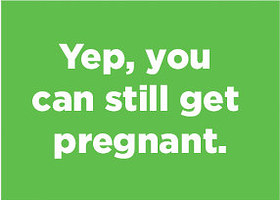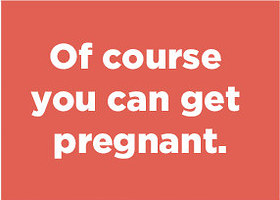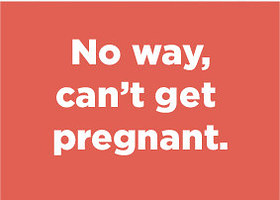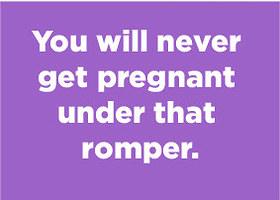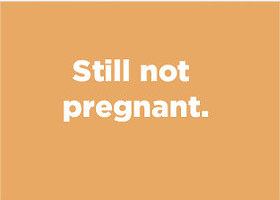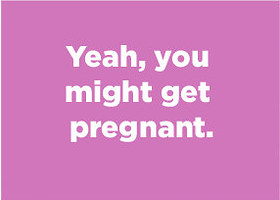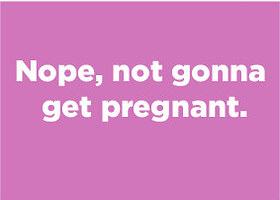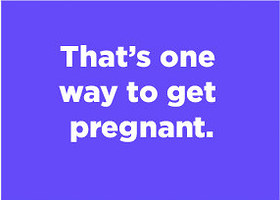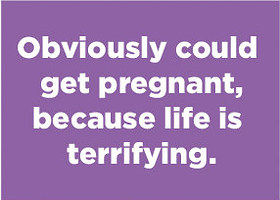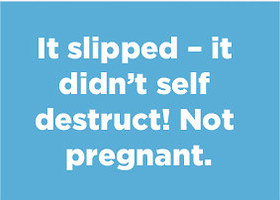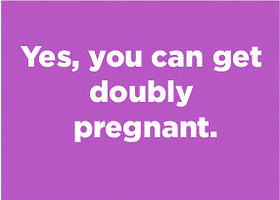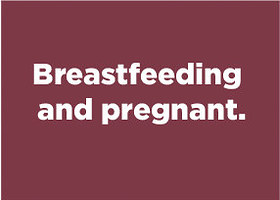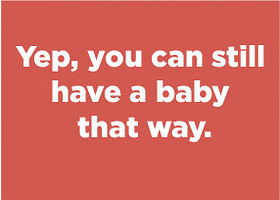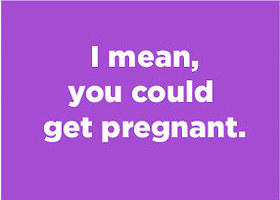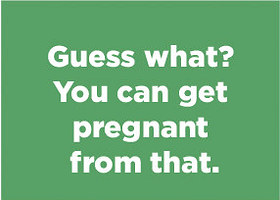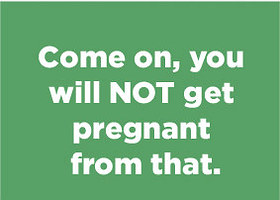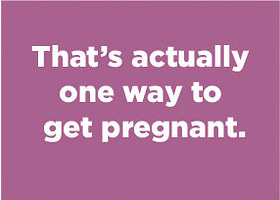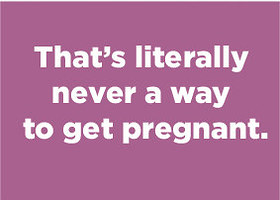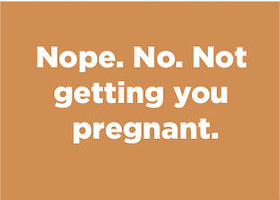Because sex ed didn’t cover hot tubs and toilet seats.
- 1.
✓ X
Tubal ligation (or getting your tubes tied) is a permanent form of birth control where the fallopian tubes are cut or blocked to prevent eggs and sperm from traveling through them. (FYI: It’s not the same thing as getting your ovaries removed, and it doesn’t affect your period.) But — shocker — it’s not a guarantee. Actually, 18.5 people out of 1,000 will get pregnant within 10 years of the surgery, and the probability is higher for younger women, according to the American College of Obstetricians and Gynecologists (ACOG). Obviously this is still extremely unlikely, but it’s worth noting that there’s a (very) small risk.
-
- 2.

✓ X
No, you don’t get a free pass this week, because life isn’t fair. It’s very unlikely to get pregnant while on your period, but it’s possible, Mary Jane Minkin, MD, clinical professor of obstetrics, gynecology, and reproductive sciences at Yale School of Medicine told BuzzFeed Life. Here’s why: Sperm can live inside you for up to seven days (WHAT). For most women, ovulation occurs around 14 days from the start of your last period, but this can sometimes happen earlier. If that’s the case and there are still sperm alive and thriving in there, they can meet and make a baby.
-
- 3.

✓ X
It has all the makings of pretty good sex — thrusting, kissing, groping, etc. — but without the risk of getting knocked up. Don’t worry, sperm isn’t crafty enough to travel through clothes, says Minkin. (Yet.)

Columbia Pictures / Via accioaskars.tumblr.com
-
- 4.

✓ X
Forget three or four pills every month or so? Researchers call that “typical use,” so basically they’re setting the bar pretty low. In this case, the pill has a failure rate of nine percent (the failure rate is the percentage of people who will get pregnant while using this method for a year). If your memory was crap this month, condoms or emergency contraception are probably in order.
-
- 5.
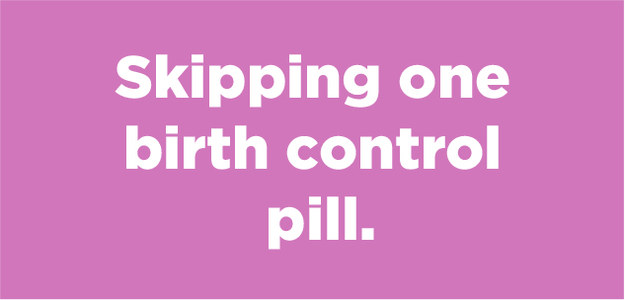
✓ X
Good news/bad news time: The good news is that missing one pill doesn’t significantly increase your risk of pregnancy. The bad news is that even perfect pill use still has a less than one percent failure rate (meaning there’s still a very small chance you could get pregnant). If you skip one pill, that failure rate is just a tiny bit higher. Pro tip: Really try not to miss the first pill in a new pack, especially if you’re on a 21/7 pill cycle (21 active pills, 7 placebo pills). This ups your risk of pregnancy due to something called escape ovulation, which is basically your ovaries waking back up, says Minkin.
-
- 6.

✓ X
No one ever got pregnant from a pearl necklace. The only way ejaculating on you can lead to a pregnancy is if your partner comes on or around your vulva, says Minkin, so maybe institute a belly button-up rule. Major caveat: We’re talking strictly ejaculation here — not having sex, then pulling out right before the orgasm, and coming on your chest or something. That’s called the pullout method, and it actually has about a 22% failure rate.
-
- 7.

✓ X
This is a tricky one, because obviously you cannot get pregnant from anal sex alone. But semen doesn’t always like to stay put, so it’s possible (though very unlikely) for it to drip down to your genitals. “Semen gets around just like bacteria gets around,” says Minkin. “If there happens to be some sperm around your vulva and one swims upstream, it’s very unlikely, but it’s remotely possible.”

-
- 8.

✓ X
The only way this could possibly happen is if the stars align in the worst way ever. If someone ejaculates on a toilet seat, that sperm could live there for up to a day, says Minkin (if literally no one cleans it up, in which case you probably shouldn’t be frequenting these bathroom stalls anyway). If you sit on said toilet seat, ignore the obvious wet spot, it somehow comes into contact with your vulva (who puts their vulva on a toilet seat anyway?), AND you happen to be ovulating… you could maybe get pregnant. But really, why would your vulva be on the toilet seat ever? So don’t be afraid to . We’re going to go ahead and give this one a thumbs down.
-
- 9.

✓ X
Even using condoms perfectly isn’t 100 percent effective – it actually has a 2% failure rate. But if the condom slips off during sex, that can increase your chances of an unplanned pregnancy.
-
- 10.

✓ X
Don’t worry – you won’t get knocked up by the hot tub goer who, um, came before you. Sperm doesn’t like it hot, says Minkin, so if the temperature of that water is hotter than 98.6 (the average body temperature), they’ll die.
-
- 11.

✓ X
While incredibly rare, getting pregnant while already pregnant can happen, says Minkin. It’s called superfetation, and it’s a phenomenon that’s only been reported several times in humans.

-
- 12.
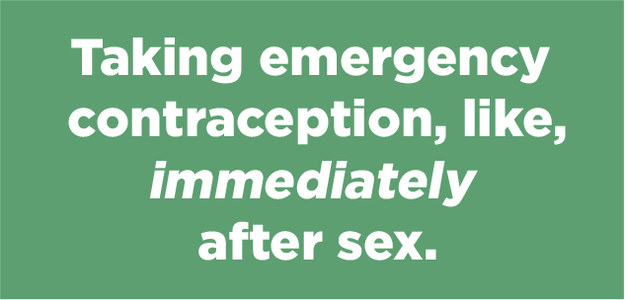
✓ X
No, the morning after pill isn’t a done deal, but it’s definitely better than nothing. When taken within 72 hours after unprotected sex, Plan B One-Step (and other brands of levonorgestrel tablets) can prevent pregnancy in about 7 out of every 8 women who would have gotten pregnant without it. The prescription-only method, ella, can prevent pregnancy when taken up to five days after unprotected sex, though it still isn’t 100 percent effective. Worth noting: Despite claims in 2013 that the morning after pill is less effective in women who weigh more than 165 pounds and ineffective in women over 176 pounds, the European Medicines Agency concluded in 2014 that the research was too limited to warrant these claims.
-
- 13.

✓ X
It’s definitely unlikely, but if that dry humping ends with ejaculation… and that ejaculation ends up near your vulva, you may have a problem. Basically, anything that lets sperm come in contact with your vulva could get you pregnant, says Minkin. (And yes, pre-ejaculate can contain sperm, too.)
-
- 14.
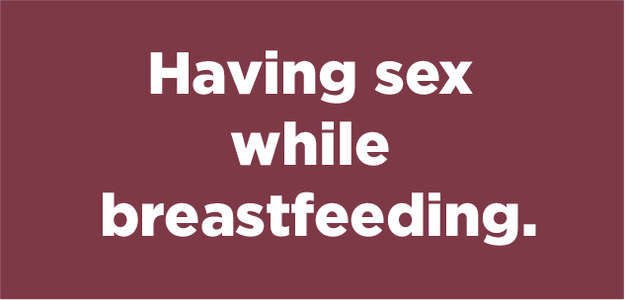
✓ X
The idea that breastfeeding = birth control is a complete myth, though it can lower your risk of pregnancy. “When you’re breastfeeding, you have a moderate amount of prolactin, and it tends to suppress ovulation,” says Minkin. That said, it’s not 100% effective.
-
- 15.

✓ X
Even if there’s semen on those sheets, sperm is highly unlikely to live on dry surfaces like bedding or clothes, says Minkin. You’re in the clear.

NBC / Via fallontonight.tumblr.com
-
- 16.

✓ X
Much like getting your tubes tied, getting a vasectomy isn’t a total guarantee against parenthood. Patients actually aren’t cleared for unprotected intercourse until a semen analysis shows they have no sperm or less than 100,000 non-motile sperm, urologist Stanton C. Honig, MD, told BuzzFeed Life. Once a patient is cleared, the chances of pregnancy are 1 in 2000, says Honig.
-
- 17.

✓ X
Nope, you can’t get pregnant from your partner’s mouth, says Minkin.
-
- 18.

✓ X
No, you can’t get pregnant by swallowing semen, either.
-
- 19.

✓ X
Like, just now? “If a guy has fresh ejaculate on his hands, yes, it could possibly end up in the vagina and then up inside,” says Minkin. But if he got off a few hours ago (or, you know, washed his hands), you’re good. “It would be highly unlikely for sperm to survive on the hands for over an hour.”

NBC / Via reactiongifs.com
-
- 20.

✓ X
Yes, you can definitely get pregnant this way — mostly because a lot of men don’t pull out in time every time. When inconsistent, the failure rate of the pullout method is about 22% (which actually isn’t much worse than the 18% failure rate associated with using condoms inconsistently). Still, it’s risky. “The first drop of semen is the most concentrated for sperm,” Minkin says. So you’re basically playing birth control roulette with this one.
-
- 21.

✓ X
Unless that vibrator has sperm on it, says Minkin, you’re good.
-
- 22.

✓ X
THANK YOUR LUCKY VIBRATOR: No, you cannot get pregnant from that.
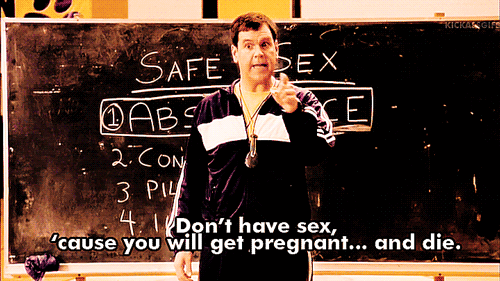
Paramount Pictures / Via weheartit.com
-










